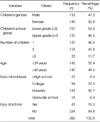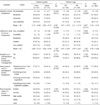Abstract
Objectives
This study was to investigate the perception of mothers of elementary school students regarding environment-friendly agricultural products in school foodservice.
Methods
A total of 282 mothers whose children were receiving environment-friendly agricultural products during elementary school foodservice in Gyeonggi participated in this questionnaire survey. The survey was conducted to investigate respondents perception and satisfaction with environment-friendly agricultural products in their children's school meals from May 29 to June 9, 2017.
Results
About 79% of the subjects were satisfied with school foodservice. The most important aspects of school foodservice were nutrition (35.8%) and sanitation (34.8%). Over 80% of the subjects were aware of environment-friendly agricultural products and about 54% of the subjects checked for a certification mark when purchasing environment-friendly agricultural products. Additionally, 72.3% of the subjects knew that environment-friendly agricultural products were used at school. The advantages of using environment-friendly agricultural products in school foodservice were safety (75.5%) and high food quality (16.3%). About 66% of the mothers knew the school was receiving support from the city or education office for using environment-friendly agricultural products. Additionally, 74.5% of the mothers responded that they are willing to pay for use of environment-friendly agricultural products when subsidies were not supported.
Figures and Tables
References
1. Choi BY, Kim BR, Lee KH. Activation plan for eco-friendly agricultural products wholesale market. Korea Rural Economic Institute;2013. 12. Report No. R711.
2. National Agricultural Products Quality Management Service Certification System. 2018. cited 2018 Jun 22. Available from: http://www.enviagro.go.kr/portal/content/html/info/signintro.jsp.
3. Jang HR, Kim HY. Survey on the satisfaction degree for school lunch program of elementary school students in Yongin. Korean J Food Nutr. 2005; 18(2):155–160.
4. Oh YM, Kim MH, Sung CJ. The study of satisfaction, meal preference and improvement on school lunch program of middle school boys and girls in Jeonju. J Korean Diet Assoc. 2006; 12(4):358–368.
5. Park KJ, Jang MR. Survey on satisfaction of fifth and sixth grade students from elementary school foodservice in Won-ju. J Korean Diet Assoc. 2008; 14(1):13–22.
6. Yi BS, Yang IS, Park MK. Annual analysis on quality attributes and customer satisfaction in school foodservice. Korean J Nutr. 2009; 42(8):770–783.

7. Lee HY, Bae HJ. Developing food safety education program for employees at school foodservice implementing HACCP. Korean J Community Nutr. 2016; 21(1):84–92.

8. Jeong JH, Kim EJ, Kim MH, Choi MK. Perception of eco-friendly agricultural products and food service satisfaction of elementary and middle school students according to eco-friendly food service day in Chungnam. J Korean Soc Food Sci Nutr. 2013; 42(1):114–119.

9. Lee YS, Lee NO, Ko SH. A survey on use of environment-friendly agricultural products for school food service by dietitians in Chungnam province. Korean J Community Nutr. 2009; 14(5):556–564.
10. Rho JO, Kim MO. A study on the utilization, recognition, and satisfaction of environment-friendly agricultural products in school food services according to the type of food Service in Jeonbuk area. Korean Assoc Hum Ecol. 2011; 20(2):427–437.

11. Jung SH, Lee YE, Park EH. Use and perception of environmentally-friendly ingredients by dietitians in Chungbuk. J Korean Soc Food Sci Nutr. 2015; 44(10):1567–1582.

12. Chang HS, Lee MJ. The perception for management of school foodservices using of environmentally friendly agricultural products of elementary school children's mothers in Gunsan. Korean J Community Nutr. 2008; 13(6):867–878.
13. Lee YS, Park MJ. Parental perception and satisfaction with environment-friendly agricultural products used for school foodservice in elementary schools in Daejeon. Korean J Food Cult. 2008; 23(6):737–747.
14. Kim NR, Cho YS, Kim SA. Satisfaction and recognition level of environment-friendly agricultural products in Cheongju area. Korean J Community Nutr. 2011; 16(1):75–85.

15. Kim H, Jeon DC. Analyses of the awareness of students' parents on school meals and their intention to increase consumption of environment-friendly agri-products. Korean J Org Agric. 2013; 21(1):19–31.

16. Jeong MH, Chae IS. A survey of eco-foodservice perception and satisfaction of elementary school parents in Jeju. J Nutr Health. 2015; 48(1):105–112.

17. Yang IS, Park MK. Identifying the quality attributes affecting customer satisfaction of school foodservice by city and province: students, parents, and faculty. J Korean Diet Assoc. 2008; 14(3):302–318.
18. The Korean Dietetic Association. Korean dietitian's activities. 2014. cited 2018 Jun 22. Available from: https://www.dietitian.or.kr/work/introduction/ki_us_activity.do.
19. Yang IS, Yi BS, Park MK, Baek SH, Chung YS, Jeong JY, et al. Evaluation of the quality attribute and satisfaction on school foodservice in 2010. Korean J Community Nutr. 2013; 18(5):491–504.

20. Lee YE. An analysis on the satisfaction with the quality of school foodservice in Chungbuk province. Korean J Food Cult. 2008; 23(1):105–114.
21. Kim EM, Jeong MK. The survey of children's and their parents' satisfaction for school lunch program in elementary school. J Korean Soc Food Sci Nutr. 2006; 35(6):809–814.
22. Kim TY, Jang WW. Analysis of consuming behavior of environment-friendly agricultural products for housewives in Daegu. Korean J Org Agric. 2011; 19(2):145–156.
23. An JH, Kang KO. Consumption type of housewives about organic and instant food. Korean J Food Nutr. 2006; 19(1):28–37.
24. Huh EJ, Kim JW. Consumer knowledge and attitude to spending on environment-friendly agricultural products. Korean J Hum Ecol. 2010; 19(5):883–896.

25. Baek M, Lee Y, Oh YJ. A study on parents' satisfaction with school foodservice by foodservice monitoring participation. J Korean Diet Assoc. 2009; 15(3):253–261.
26. Kim IJ, Lee JH. The housewives' purchase behaviors on environment-friendly agricultural products in Daejeon area. Korean J Community Nutr. 2011; 16(3):386–397.

27. Nam YS, Kim HA. Parents' perception on middle school foodservice using environment friendly agricultural products (EFAP) in Masan area. Korean J Nutr. 2012; 45(2):181–191.

28. Kim YS, Han YS. A study on the utilization present status and the satisfaction with environment-friendly agricultural products. In : Proceeding of 2006 Spring Science Meeting of the Korean Food & Cookery Science; 2006 May 19; Daejeon. p. 145.




 PDF
PDF ePub
ePub Citation
Citation Print
Print







 XML Download
XML Download